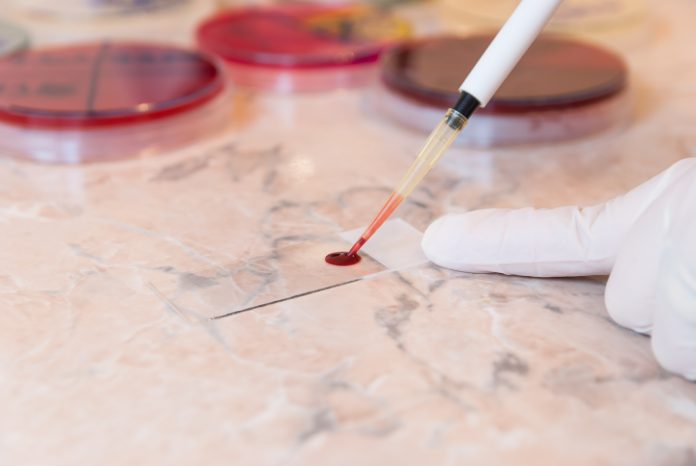PinPoint Data Science is working with the NHS to deliver much needed innovation in cancer referral pathways
More than two years have passed since the start of COVID-19’s impact on life in the UK. The rules and restrictions we have lived under during that time may be on their way out, but the consequences of a prolonged viral pandemic on our healthcare system are far from over. This is especially apparent in the backlogs that currently exist in NHS cancer referral and diagnosis.
Analysis for the House of Commons has revealed that half a million people in England with suspected cancer will have to wait longer than the two-week limit to see an oncologist in 2022.
On World Cancer Day 2022, the Secretary of State for Health and Social Care, Sajid Javid, declared a “national war on cancer”. He made an impassioned call for innovation and new “cutting-edge technologies like AI” to bring the fight to cancer.
The PinPoint Test: an AI-driven, affordable blood test to optimise cancer referrals
The PinPoint Test is an entirely new type of blood test for cancer detection. It is fully integrated within existing
NHS systems and uses hardware that is part of standard NHS blood testing in labs up and down the country. As a software platform, no new physical infrastructure is required, meaning the test is both affordable and highly transferable for a swift rollout across the NHS.
Uniquely, the PinPoint Test uses the results from a range of well-established standard tests to generate something entirely novel: a single number – the chance that a patient has cancer.
The Test gives clinicians a decision support tool with which to more effectively triage and prioritise symptomatic patients on the two-week wait urgent cancer referral pathway. Deployed at scale, the PinPoint Test will deliver enhanced diagnostic capacity, reduced waiting lists, reduced patient anxiety and cost savings to the NHS.
The Test is currently undergoing a service evaluation run by the West Yorkshire and Harrogate Cancer Alliance. This is the final step before being able to deploy across wider regions of England, in preparation for which PinPoint recently received an SBRI Healthcare grant of £752,000. Early results are extremely encouraging but the very challenges the PinPoint Test is designed to help resolve are also the greatest obstacle to delivering change at this moment of greatest need.
Machine learning and the cold start problem
The idea of using data analysis in cancer diagnostics isn’t a new one, but before analysis must come data: the so-called ‘cold start problem’. PinPoint needed access to a statistically significant database of digital medical records to begin experimenting with models of analysis, but these weren’t common when they started in 2017. Fortunately, the ground-breaking work of Professor Geoff Hall at Leeds Teaching Hospitals NHS Trust meant that such a dataset already existed and the ecosystem he and colleagues established in Leeds is one of the primary reasons that PinPoint Data Science is based there now.
Professor Hall had identified as early as 2001 that delivering high-quality personalised care to patients requires access to a level of information that the traditional system of written notes in case files was unable to deliver. His clarity of vision led to the development of an integrated digital care record for patients in Leeds, encompassing the whole health and social care spectrum, now known as PPM+. This not only provides a platform for clinicians to deliver improved personal care but is also a source of uniquely detailed data with which to develop virtual tools.
It wasn’t until April 2018 that PinPoint secured permission to access anonymised cancer patient data from PPM+ and those early months were spent testing models for the application of machine learning to the data. What followed was a large-scale retrospective analysis of 371,799 patients from the Leeds region between 2011-2019, comprising development and validation sets of 224,669 and 147,130 patients respectively.
By early 2020, PinPoint Chief Scientist, Dr Richard Savage and his team had established an evidence base for the efficacy of the test and were preparing to build a fully regulated software IVD (in vitro diagnostic).
COVID-19: Catastrophe & catalyst
In March of that year, the UK enforced lockdown measures to control the spread of COVID-19. Those in the field immediately recognised the danger to cancer care.
The West Yorkshire and Harrogate Cancer Alliance and their Strategic Clinical Director, Professor Sean Duffy, looked to innovations in the pipeline for potential solutions to imminent mounting backlogs. On the strength of evidence from the retrospective study, the PinPoint Test entered into a service evaluation run by the Cancer Alliance.
The threat of the pandemic served as a catalyst to accelerate the development and evaluation of the PinPoint Test. As a fully regulated system with a sound evidential base already in place, the service evaluation serves two purposes: to confirm the performance of the test in a real-world setting and to establish the logistics of running a new test like this in the NHS, including information governance, laboratory protocols and IT systems integration.
“As a software platform, no new physical infrastructure is required, meaning the test is both affordable and highly transferable for a swift rollout across the NHS.”
The service evaluation is currently live in Secondary Care at Mid Yorkshire Hospitals NHS Trust and Leeds Teaching Hospitals NHS Trust, and in Primary Care in Wakefield and Kirklees. Participation in different pathways at Secondary Care level is being introduced gradually but GPs are already referring patients in all 9 pathways covered by the PinPoint Test: Breast, Gynaecological, Haematological, Head & Neck, Lower GI, Lung, Skin, Upper GI and Urological. These cover over 98% of all ‘two-week wait’ referrals.
Preparation for rollout of the PinPoint Test
Longstanding support from the Yorkshire and Humber AHSN and the West Yorkshire and Harrogate Cancer Alliance has translated into additional funding from SBRI Healthcare this year. This means PinPoint is now working with AHSNs, Cancer Alliances and NHS Trusts in four additional regions in England: Cheshire & Merseyside; Humber, Coast and Vale; Lancashire & South Cumbria and Surrey & Sussex.
Together with these organisations, PinPoint is laying the foundations for widespread adoption of the Test, including quality assurance across laboratories and an implementation playbook to support rapid roll-out. In addition, we are building educational tools for medical professionals and patients to better understand what a result from the PinPoint Test means and how it can inform but not dictate a pathway to diagnosis.
The pandemic caused many of the problems with backlogs we see today, and the NHS is heroically fighting back. Innovation and new technology are one of the best ways out of the situation, but they take time to deploy. PinPoint is working hard with the NHS and clinicians to support them through this moment of need.
An appeal is being made to doctors in participating areas to reach out to the West Yorkshire and Harrogate Cancer Alliance for more information about participating in the PinPoint service evaluation.
For more information on PinPoint Data Science and the PinPoint Test, please visit: www.pinpointdatascience.com












